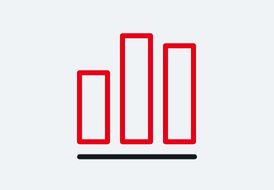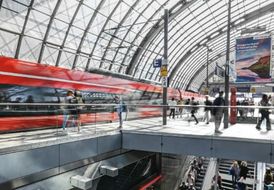Developments in relevant markets
After the Covid-19 restrictions were gradually lifted in the European countries from March 2022, demand in passenger transport increased again. The pent-up demand for travel had a positive effect, especially on long-distance and cross-border traffic. Temporary service restrictions were withdrawn, and at the same time there was a gradual expansion of services in some countries, especially in leisure traffic to tourist destinations. In summer 2022, demand for long-distance transport was again above pre-Covid levels for many connections. Local rail passenger transport has not yet fully reached 2019 demand levels in large parts.
Inflationary pressures across Europe, including the impact of the energy crisis, has led to pressure on wages. 2022 therefore saw some challenges from strike action, including in the United Kingdom and the Netherlands.
United Kingdom
- Following the Williams-Shapps plan for rail, the UK government is creating a new public body, Great British Railways (GBR), which will run and plan the rail network, own the infrastructure, and receive the fare revenue. There will remain a significant role for the private sector through the development and deployment of passenger service contracts. The Department for Transport published a consultation which examines the legislative changes required and seeks views.
- Since June 2022, industry-wide strike action has impacted the UK rail industry as part of a dispute over wages, jobs and conditions. Trade union members have taken part in multiple strike days in response to the UK Government’s proposals to reform the rail sector. In the latter part of the year, difficult wage negotiations in response to the growing cost of living became the main cause of industrial dispute.
- The Bus Recovery Grant (BRG), which is a government funding mechanism for commercial bus operators in England to offset the ongoing impact of Covid-19, was extended twice during 2022. Initially the funding was due to end in October 2022, but BRG was extended by the UK government to provide an additional GBP 130 million to the bus industry until the end of March 2023. BRG funding requires operators to conduct network reviews in partnership with local authorities.
- In April 2022, the UK government announced financing packages for areas in England to help deliver on their Bus Service Improvements Plans (BSIP) as part of the National Bus Strategy to support the transformation of bus services. Operators and local authorities cooperated in the application for BSIP funds.
- On September 3, 2022, the UK Government announced that it would be investing GBP 60 million to introduce a GBP 2 fare cap on a single bus ticket on services in England outside of London. The cap will be in place from January 1, 2023, and will run for three months.
France
- DB Arriva continues to follow market opening developments in France very closely. The framework in which operators will need to deliver rail services in future was put in place in 2020/2021. The first regional rail transport contract was confirmed by Region Sud in October 2021. Other French regions are now in the process of opening up their rail networks to competition. The results of several tenders are expected in 2023 as well as further tender announcements.
Mainland Europe
- Recovery from Covid-19 has continued across Europe and whilst some effects persist, Covid-19 is currently having limited impact on operations.
- There is significant challenge across Europe due to fuel inflation and volatility. This is partly mitigated through hedging and pricing, as well as DB Arriva’s transformation programµ 157 which has provided overhead and operational cost reduction, plus much improved economic management in the selection of the best contracts to maintain profitable growth.
- Driver shortages and wage pressures across Europe continue and this, coupled with general inflation, is providing a challenging environment. There is continuing consideration into alternative ways to attract workers or offset cost increases.


